The "Jolly Hoodening" song
Click here for other hoodening songs
This song is quite well known (among revivalists etc.) as 'the' Hoodening song, due to its mention in the 1909 book by Percy Maylam. It is sometimes referred to as the 'Blean' Hoodening song but was also apparently linked with Broad Oak. The tune commonly found today is however entirely apocryphal!
Here are the words as included in Maylam:
Three jolly Hoodening boys lately come from town,Apples or for money we search the country round;
Hats full, caps full, half bushel baskets full –
What you please to give us, happy we shall be.
God bless every poor man who’s got an apple tree.
The words too are largely a wassailing text: The Gentleman's Magazine includes this version, supplied on 14 March 1791 by a correspondent named Alphonso, taken from 'the South-hams of Devonshire, on the eve of Ephiphany':
Here's to thee, old apple tree;Whence thou may'ſt bud, and whence thou may'ſt blow!
And whence thou may'ſt bear apples enow!
Hats full! — Caps full!
Buſhel — buſhel — ſacks full!
And my pockets full too!
Huzza!
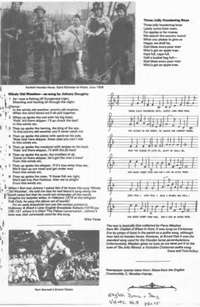 Maylam offered no information on the tune. To remedy this, popular folk singers Dave and Toni Arthur penned an article in the English Folk Dance & Song Society (EFDSS) journal "English Dance & Song" in 1980, where they wrote "we have put it to the tune of 'Six Jolly Miners', a Yorkshire Christmas quête song" and demonstrated this with a musical score. However, they did not keep strictly to the Maylam original: lines 4-5-6 were rearranged as lines 5-6-4-6, in addition to some other small changes in the wording:
Maylam offered no information on the tune. To remedy this, popular folk singers Dave and Toni Arthur penned an article in the English Folk Dance & Song Society (EFDSS) journal "English Dance & Song" in 1980, where they wrote "we have put it to the tune of 'Six Jolly Miners', a Yorkshire Christmas quête song" and demonstrated this with a musical score. However, they did not keep strictly to the Maylam original: lines 4-5-6 were rearranged as lines 5-6-4-6, in addition to some other small changes in the wording:
For apples or for money, we search the country round.
What you please to give us, happy we shall be –
God bless every poor man who's got an apple tree.
Hats full, caps full, half a bushel bag full –
God bless every poor man who's got an apple tree.
Sometime after this, we started using this tune, although we swapped the order of the lines to be closer to what was in Maylam, i.e. 4-(6)-5-6. Over time we made a slight change to the tune in line 2 (MIDI file), and off and on we changed one word in line 5 (probably due to our renowned ability to forget words!). We also naturally changed the number of 'jolly hoodening boys' to suit however many were with us on each occasion.
Here is the modern version most commonly used:
Five (etc.) jolly Hoodening boys lately come from town,For apples or for money, we search the country round.
Hats full, caps full, half a bushel bag full –
God bless every poor man who's got an apple tree.
What you choose to give us, happy we shall be –
God bless every poor man who's got an apple tree.
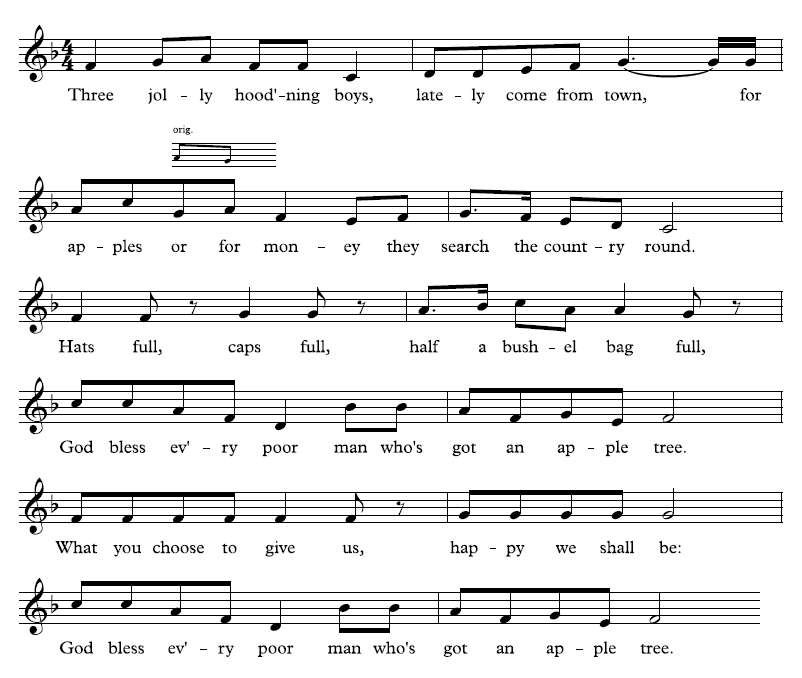
However, it's also worth noting that Six Jolly Miners itself appears to have numerous different tunes. Here is one which is quite close to the above:
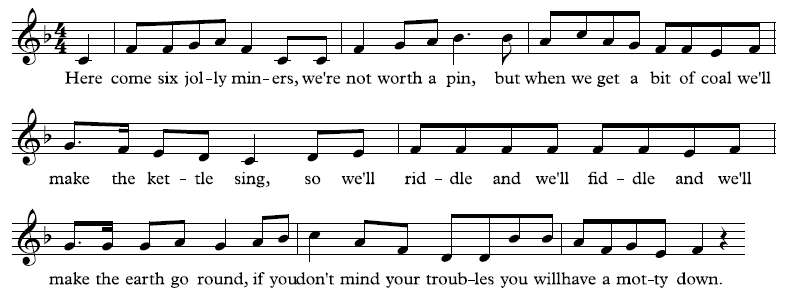
This is the version sung by Coope, Boyes & Simpson in 2010 in the video below — a brilliant three-part harmony a cappella rendering.
Coope, Boyes & Simpson singing Six Jolly Miners in 2010 — "Christmas in Yorkshire"
Two more recordings with quite similar tunes follow. First, Ted Frost in 1981, whose tune is closer to ours at the beginning, although some words are different from CB&S:
Ted Frost singing Six Jolly Miners in 1981
It's not unusual for words to change — in some cases it is simply because the order of verses has been reversed. Mudcat has more details of the words to (and origins of) the 'Six Miners' song, and it can also be found at the Vaughan Williams Memorial Library, and Mainly Norfolk, and amongst the Broadside Ballads at the Bodleian.
Next the Grenoside Sword Dancers in 2010 — again, quite close at the start but some changes in both lyrics and tune:
Grenoside Sword Dancers singing Six Jolly Miners in 2010
Compared with these, the version sung by Dave & Toni Arthur themselves on "The Lark in the Morning" in 1969 is noticeably different — both tune and words: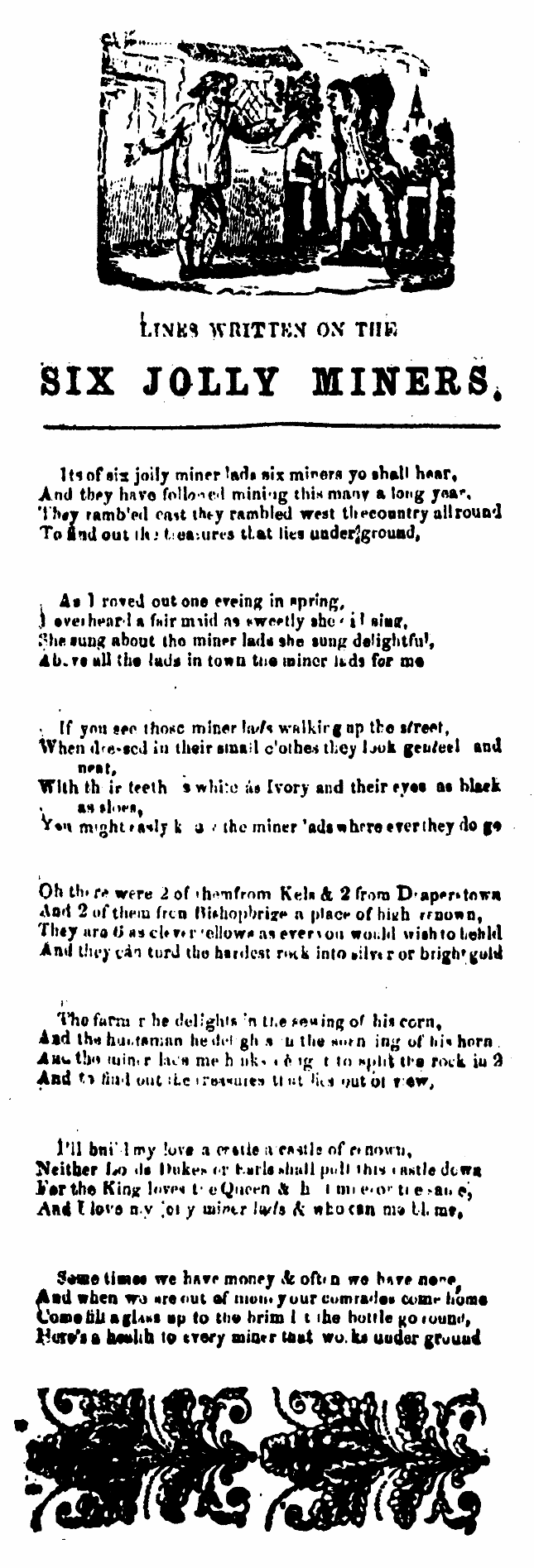
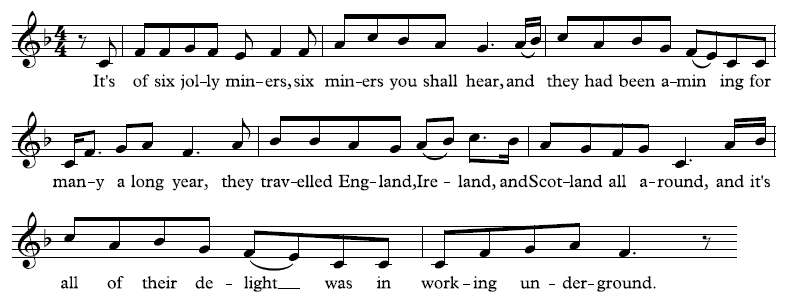
Dave & Toni Arthur singing Six Jolly Miners in 1969
There is a "Derbyshire" version by Alan Rosevear which is fairly similar to theirs:
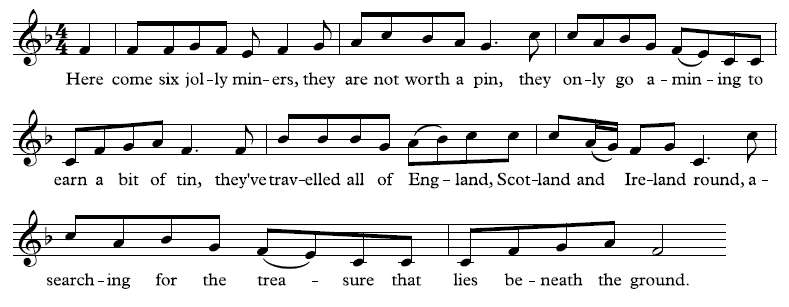
Alan Rosevear singing Six Jolly Miners
Pete Castle too is quite similar:
Pete Castle singing Six Jolly Miners
And likewise Victor Turp Brown — another "Derby" version:
Victor Turp Brown singing Six Jolly Miners
There is however some further confusion. Our records are unclear regarding when and how the EFDSS suggestion started being used by Hoodeners post-1980. One theory states that the Oyster Ceilidh Band (associated with Oyster Morris and hence the Whitstable Hoodeners) read the article and were the first to begin using it; indeed, their inaugural album, "Jack's Alive" (1980) opens with a track called "The Blean Hoodening Song". But… if you listen to Cathy Lesurf's vocals, you can tell that it's a totally different tune (and uses the original Maylam words, not the amended version).
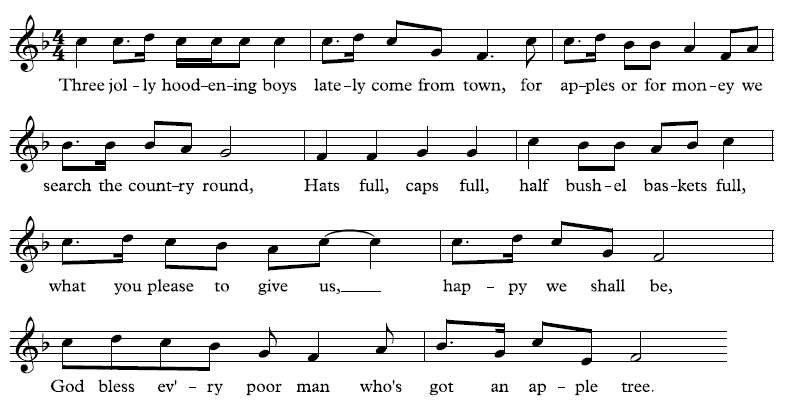
George Frampton claimed, in his 2019 Auto-Hoodening talk, that this 'Oyster' tune came from the famous Dungworth carol sessions — in Yorkshire, near Sheffield — which perhaps ties in with the "Yorkshire" reference in Dave and Toni Arthur's article. However, it seems hard to reconcile the 'Oyster' tune with any of the Six Jolly Miner songs we've found, so the mystery is as yet unsolved. Maybe George is mistaken, and it was a Cathy Lesurf original? In any case, we were already using the "jolly hoodeners" song (to the first of the '6 Miners' tunes above) in St Nicholas-at-Wade in 1981, before Whitstable Hoodeners even existed…